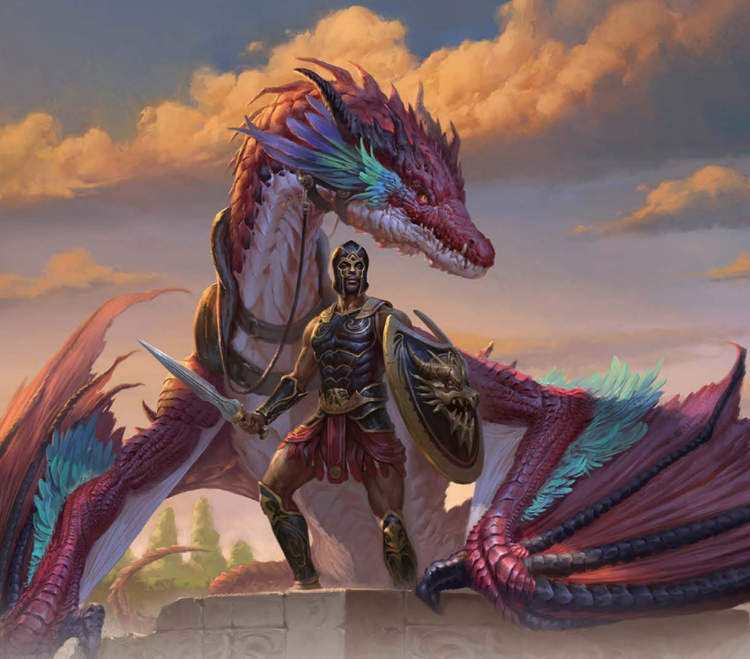Paladin - Oath of the Dragonlord
Dragonlords are paladins who seek to extend their reach across the land by binding a dragon into their service. Such a task should never be undertaken lightly. Forming a true bond with a dragon requires a paladin to hatch a dragon egg and raise the wyrmling from the first moment it draws breath. Raising a dragon in this way requires the paladin to lay their life on the line by swearing an oath. This oath creates a reciprocal bond between the paladin’s soul and the soul of the dragon. But finding a dragon egg is no easy task either. For this reason, Dragonlords summon pseudodragon familiars and train them to seek out the perfect egg. This process may take years, and many paladins come to view the pseudodragon as a partner in the oath. When an egg is finally discovered, the paladin and the pseudodragon may share an almost parental pride in the hatchling. Once the paladin’s dragon is grown, its master becomes a true Dragonlord. But the paladin is as much a servant to the dragon as the dragon is to its master. The two are one—their destinies are interlinked—and whatsoever pain is suffered by one is also felt by the other.
Oath Spells
Starting when you swear your oath at 3rd level, you gain Oath Spells at the listed levels and always have them prepared.
Oath of the Dragonlord Spells
| Paladin Level | Spells |
|---|---|
| 3rd | hunter’s mark, find familiar |
| 5th | gust of wind, levitate |
| 9th | fly, haste |
| 13th | freedom of movement, stoneskin |
| 17th | hold monster, telepathic bond |
Pseudodragon Familiar
When you cast the find familiar spell, you summon a pseudodragon instead of one of the normal forms described in the spell. The pseudodragon’s primary purpose is to find you a dragon egg. The pseudodragon can smell dragon eggs if they are within one mile. The pseudodragon is likely to find a dragon egg by the time you are 5th level, but it might be earlier. If your pseudodragon hasn’t found a dragon egg by 6th level, then it departs in search of one. In 3d6 days, the pseudodragon returns to you with a dragon egg of your choice from this list: brass, bronze, copper, or silver. If at any time your dragon egg is lost or destroyed, your pseudodragon will depart in search of another one. It will return in 3d6 days with the lost egg or a suitable replacement. If you deliberately lose or destroy your egg, then your pseudodragon refuses to perform this service.

Channel Divinity
When you take this oath at 3rd level, you gain the following two Channel Divinity options.
Dragon’s Wrath. As an action, you can mimic the frightful presence of a dragon, using your Channel Divinity. You issue a roar as loud as an adult dragon. Each creature of your choice that is within 60 ft. of you and aware of you must succeed on a Wisdom saving throw or become frightened for 1 minute. A creature can repeat the saving throw at the end of each of its turns, ending the effect on itself on a success.
Scorn the Unworthy. Your dragonlord oath elevates you above the multitudes of the corrupt and the weak. As an action, you can intone the Dragonlord’s oath, using your Channel Divinity. Enemy creatures within 30 feet that are Large or smaller in size must make a Charisma saving throw. On a failed save, the creature falls prone and loses concentration on any spells that it has active.
Dragonlord’s Bond
At 7th level, your dragon egg will hatch. You must cast the spell bond of the dragonlords while touching the newborn wyrmling within 24 hours of it hatching. The dragon wyrmling is now bonded to you. Additionally, you may cast the spells bond of the dragonlords and dirge of the dragonlords, and they require no material components when you cast them. Your wyrmling has hit points equal to 40 + twice your paladin level, and it adds your proficiency bonus to its saving throws.
Young Dragon
By 15th level, your dragon grows into a young dragon of the appropriate type if five years have not yet passed since its hatching. The dragon will now allow itself to be used as a mount. In addition, while mounted on a dragon, you gain that dragon’s damage resistances, damage immunities, and senses (blindsight, darkvision, and its passive Perception if it is greater than yours).
Unbreakable Bond
By 20th level, you and your dragon have learned to fight in unison on the battlefield. Your dragon gains access to its Multiattack feature, and its breath weapon now recharges using the normal rules each round instead of using the restriction outlined in bond of the dragonlords. Additionally, when your dragon fails a saving throw, you may choose to have it succeed instead. This ability recharges after you and the dragon complete a long rest.